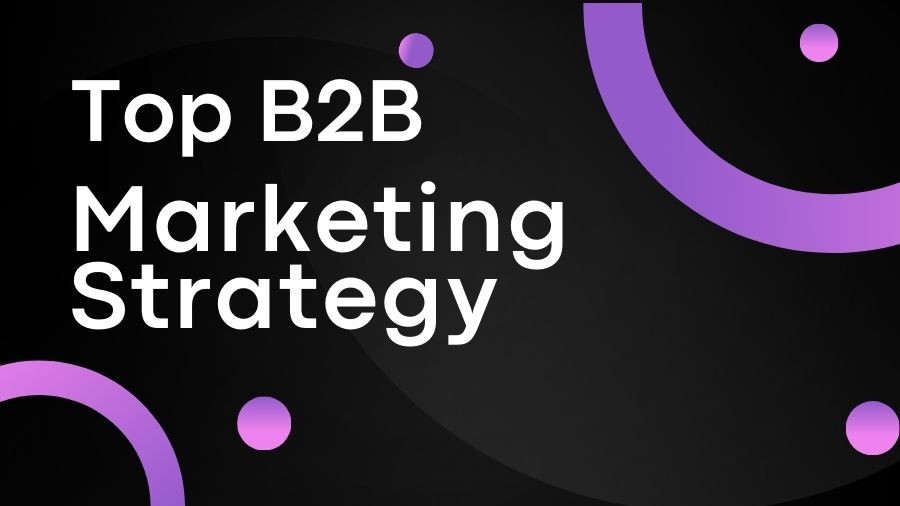Actionable B2B Marketing Strategies for Business Success
05 December, 2024

Effective B2B marketing is essential for businesses aiming to build stronger customer relationships and achieve sustainable growth. The competitive nature of the market demands innovative and practical strategies to meet rising expectations. A detailed article on B2B Marketing Strategies provides actionable insights to help businesses refine their marketing approaches and drive impactful results.
Effective B2B marketing strategies boost lead generation and customer retention. Over 93% of B2B marketers use content marketing to build brand trust, while marketing automation increases efficiency by 30%.
Marketing in a business-to-business context requires more than traditional tactics. Companies often face challenges such as reaching the right audience, nurturing leads effectively, and retaining long-term clients. The right strategies can address these issues while ensuring businesses remain competitive. This article highlights multiple methods to enhance marketing initiatives, including leveraging digital tools, crafting effective content, and focusing on customer engagement.
One of the core aspects discussed is the importance of social media in modern B2B marketing. Platforms like LinkedIn, Twitter, and even Instagram have become critical for establishing connections with decision-makers and showcasing expertise. The article emphasizes using these channels to share relevant updates, industry insights, and thought leadership content that resonates with the target audience.
Another key focus is content marketing, which continues to be an effective way to engage potential clients. By sharing educational and informative resources, businesses can position themselves as industry leaders while gaining trust from their audience. From blog posts to whitepapers and webinars, creating valuable content helps attract leads and nurture them into loyal customers.
The article also outlines the role of data analytics in improving marketing effectiveness. By analyzing customer behavior and campaign performance, businesses can adjust their strategies to meet market demands. Analytics tools provide insights that make marketing campaigns more targeted and impactful. This ensures resources are utilized efficiently, maximizing return on investment.
For those seeking detailed guidance on actionable B2B Marketing Strategies, the full article can be accessed here: https://blog.b2bmap.com/b2b-marketing-strategies-that-works-for-your-business.
The use of marketing automation tools is also highlighted as a way to simplify repetitive tasks while improving efficiency. Automation platforms can handle functions such as email campaigns, lead scoring, and performance tracking, freeing up resources for more strategic activities. Businesses using automation tools can enhance customer targeting and maintain consistent communication with potential leads.
Lead generation is another critical area explored in the article. It discusses the need for both quality and quantity in generating leads that align with business goals. Suggestions include creating tailored offers, optimizing landing pages, and using personalized email campaigns. The emphasis on personalization ensures that businesses connect with their audience more effectively, making interactions meaningful and impactful.
For those looking to understand how these strategies Works for Your Business, the full article offers valuable insights. Access it directly at this link: https://blog.b2bmap.com/b2b-marketing-strategies-that-works-for-your-business.
In addition to these practical approaches, the article discusses the importance of aligning marketing goals with overall business objectives. Whether it is to expand the customer base or enhance brand visibility, aligning strategies with measurable outcomes is vital for success. This approach ensures that all marketing efforts contribute to broader company goals.
Smaller businesses can benefit from focusing on cost-effective techniques, such as organic social media engagement and SEO optimization, while larger firms might explore multi-channel campaigns and advanced analytics tools. The flexibility of these strategies makes them applicable across industries and business sizes, ensuring wide-ranging appeal and usability.
Customer retention is another crucial element addressed. The strategies include maintaining regular communication, providing exceptional post-sale support, and rewarding loyalty through exclusive offers or programs. These efforts help foster long-term relationships that are mutually beneficial and build trust over time.
Brand consistency is also highlighted as a key factor in successful B2B marketing. Businesses are encouraged to maintain a unified voice across all platforms and touchpoints. Whether through social media, email marketing, or in-person events, consistent messaging reinforces brand identity and builds credibility.
The article dives deeper into building effective campaigns that balance creativity with data-driven decision-making. Businesses are encouraged to experiment with different formats and approaches to determine what resonates best with their audience. Flexibility and adaptation play an essential role in refining strategies over time.
Readers interested in enhancing their marketing efforts can find these strategies and more by exploring the full article. It serves as a comprehensive guide for improving marketing performance and achieving business goals.
